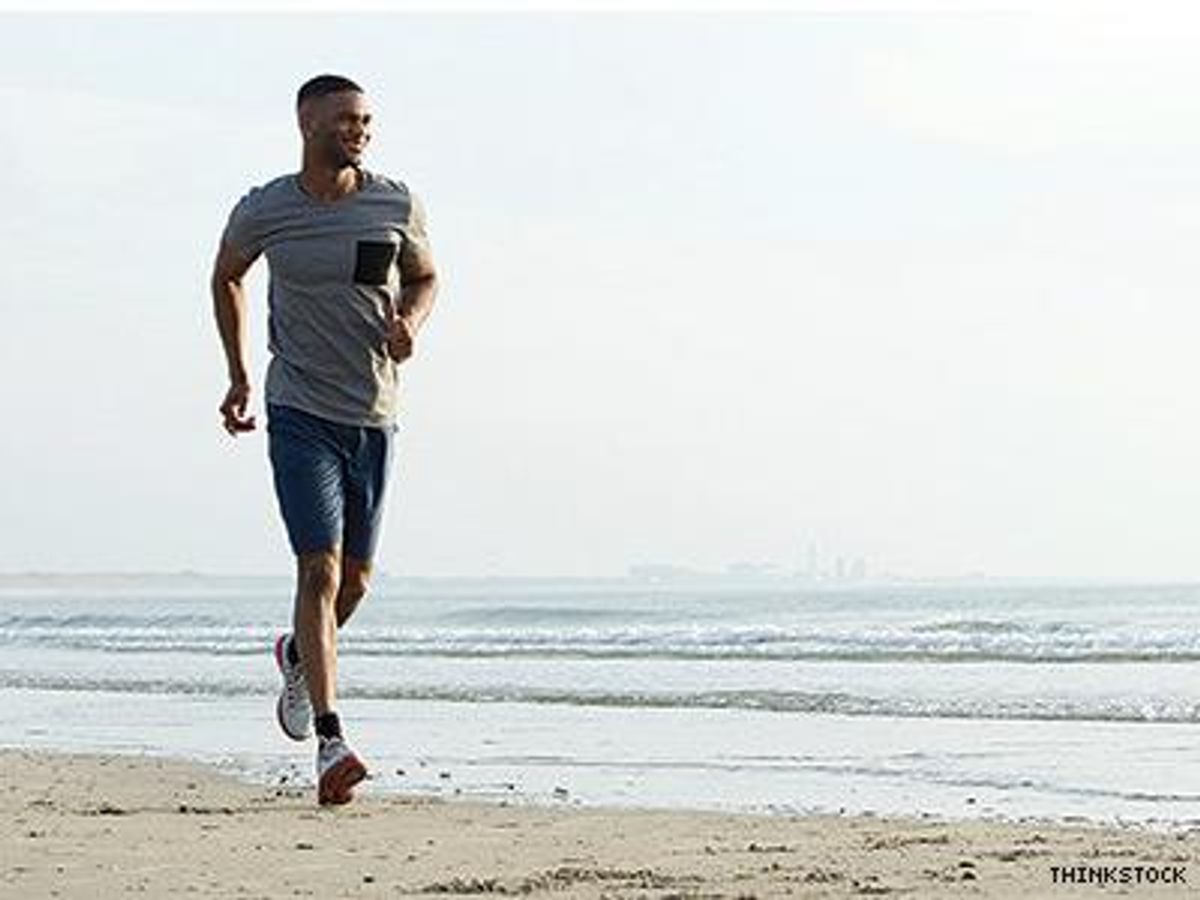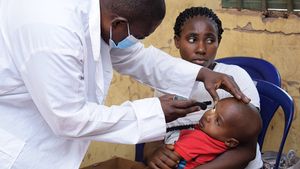My doctor has told me that I'm at risk for high blood pressure and placed me on blood-pressure medication. What's the best way to augment my workout routine in this situation?
Yoga improves immune function, high blood pressure, anxiety, depression — even irritable bowel syndrome. It's accessible and inexpensive, with many community classes free of charge, and nearly every specific interest and demographic, from 13th-step yoga (for those in a 12-step program) to hot nude yoga for the adventurous and daring. The benefits of yoga become evident only if you do it regularly. Make an effort to practice the asanas [yoga positions] you have learned with discipline. Above all, listen to your body and don’t force yourself into any exercise situation where you don’t feel comfortable. Take breaks, drink water, and breathe. If you’re an animal lover and have room to adopt, dogs are proven to reduce blood pressure too.
I've been lifting weights five or six days a week for the past year, but I haven’t really been able to put on much weight. I’m feeling tired and unmotivated all the time. Is it possible for someone with HIV to work out too much?
You’re probably lifting weights too frequently and inadvertently hampering your muscle growth. It’s called “overtraining” (training too hard and too often without giving the body enough time to rest in between workouts). The effects of overtraining usually show up as fatigue and extreme muscle soreness. Sometimes, as in your case, the signs are even more serious: depression, low energy, insomnia, loss of appetite, and worst of all, loss of lean body mass. With plenty of rest you can turn this around. Cut back on your training and make sure you’re getting adequate rest between workouts. Find a trainer to meet with to explain how to schedule your workouts. Take a hard look at everything you’re eating (or not eating) and figure out if you’re getting enough macronutrients (carbs, fat, protein).
I’ve heard that taking glutamine and creatine can have positive effects in people who are HIV-positive. But there doesn’t seem to be much information about these sports supplements and any potential interactions with antiretroviral therapy. Can you shed some light on this?
When it comes to sports supplements and their potential interactions with HIV meds, research is scant and inconclusive. But an ounce of prevention is worth a pound of cure, so supplementing with L-glutamine is a smart way to keep your lean body mass up. While no adverse effects have been reported with glutamine use, other supplements such as Saint-John’s-wort (which has significant interactions with some HIV meds) have illustrated the complexity of adding “natural” substances to an antiretroviral regimen. Creatine may also have a place at the table, but your doctor can help you balance the benefits of these sports supplements with your overall treatment regimen. It’s best to avoid products that have documented interactions and to communicate with your doctor about all the supplements you’re using. That way, he or she can take them into account if you develop any side effects or if your viral load response is not appropriate. You might want to check out the HIV Plus Treatment Guide mobile app or online version as well for drug interactions.
My doctor says it’s time to start taking antiretroviral meds. I’m worried about the possibility of wasting and body-fat redistribution, especially from my butt. I currently lift weights and do some cardio, but my doctor told me not to do exercises for my glutes like lunges, squats, or deadlifts because I have arthritis and degenerating discs in my spine. Is there something else I can do to keep my body and my butt in shape?
While the primary touchstone for people with HIV is weight training, cardiovascular exercise is probably the best natural medicine for depression, and regular cardio results in feelings of self-mastery and accomplishment. Yoga is also an option for you, allowing you to connect with your body while quieting your mind. Many gyms offer classes that target the glutes. My own free fitness training app, PocketSAM (Pocket-sam.com) also contains workouts specifically to address this. Consider doing a spin classes, or doing exercises with your own bodyweight, too.
I was recently diagnosed with peripheral neuropathy. I still have feeling in my fingers, but I've lost most of the feeling in my toes. Do you have any advice on ways I can manage this condition through exercise or supplementation?
Resistance training is a great way to improve overall muscle strength, especially for people with neuropathy. One study found that people who walked four days a week for one hour slowed down the worsening of their neuropathy. Seated resistance exercises are an excellent choice, as are swimming, rowing, and pretty much any upper-body exercise. If you don’t have access to weight machines, try these other simple movements anywhere. But avoid high-impact exercises like running on a treadmill or jumping up and down, as this can result in foot injuries.
It’s been months since I've been in the gym, and I’m finding it hard to go back. Between my job and my family and trying to take care of my dad (who is almost 80), I just don’t have the time. I’ve also been depressed about having HIV and worrying that people think I’ve lost weight because I'm positive. How can I break this cycle?
When you’re under a lot of stress, remember exercise is a gift that you give yourself. The best thing you can do for your physical and mental health is to stake out some “me” time and recommit to a more active lifestyle. The mood-enhancing benefits of exercise and its effects on the immune system are well documented and more durable than once thought, lasting up to 12 hours after the workout is over. Unfortunately, stopping exercise only enhances feelings of isolation, anxiety, and depression. Don’t let the gym scene drag you down any longer. Get outside. Change your environment. Take advantage of your surroundings. Go for a brisk walk around the neighborhood, swim at a local pool, hike a new trail, take a self-defense class, sign up for the AIDS Walk, or join a team. Many AIDS Walks have pre-walk trainings where groups get together and work and walk increasing amounts of distance, working up to the big day.
My trainer told me that doctors sometimes prescribe testosterone for people with HIV. Do you think it would help me put size on faster?
Yes, suprapysiological levels of testosterone (and growth hormone) will increase lean body mass, reduce fat, and improve well-being, but the long-term effects are largely unknown. I’d make an appointment with your doctor for blood work. Meanwhile, do everything you can to enhance your natural levels of testosterone, eat a balanced diet, take a multivitamin, get enough sleep, and avoid excessive caffeine, alcohol, and nicotine. If you have a trainer, ask him or her to use more multiple joint exercises (e.g., lunge, bench press, deadlift, clean, squat, pull-up) as these exercises can play a role in higher levels of post-workout testosterone. If after you’re tested, your natural level of testosterone is below the normal reference range, have a robust conversation with your doctor that covers all all the options. There are testosterone patches, gels, creams, injections — even implants.
I have a cold. Should I continue going to the gym and getting in a workout, or is it better to wait until I'm feeling better?
My general rule is: Listen to your body. If you’re sneezing and have a runny nose, it's probably not out of the question, but never work out with a cough, sore throat, or fever. When I’m sick, I stop all exercise and don’t push myself while my body is recovering. My own physician tells me that we are most contagious during the first two or three days of a cold, so by staying home I’m also helping to protect other people in the gym from getting sick. I also speed up my healing time so I can get back in the gym faster.
Do I need to be more worried about picking up bacteria like methicillin-resistant staphylococcus aureus or other forms of staph?
Yes. According to the U.S. Centers for Disease Control and Prevention, we could be at risk for a more severe illness from MRSA than someone who is not HIV-positive. And the treatment can take several days to administer and be invasive and not always successful. Wash your hands and other body parts with soap and running water. Keep fingers out of your nose. Be very careful around any broken skin since this is one common way for the bacteria to get inside you. Using a towel during your workout to create a barrier between anything that touches your skin (a weight bench, for example) provides some additional protection. After your workouts, wash your towels in hot water and always dry them in a hot dryer. Many gyms provide hand-sanitizer dispensers and alcohol-based sprays or wipes for equipment. Make use of them before and after your training.
One of my friends is going on and on about how good human growth hormone is. I’ve learned that if something sounds too good to be true, it probably is. Can you tell me about it?
Human growth hormone is just that: a hormone that stimulates growth and reproduction of human cells. It’s responsible for a variety of functions in the body, most notably the increase in height during adolescence. While it’s not a steroid per se, HGH is frequently associated with steroids because it's a controlled substance often used by bodybuilders. In the United States, it’s available by doctor’s prescription under the brand name Serostim. It is sometimes prescribed for people suffering from wasting syndrome but also the redistribution of fat (lipodystrophy).
There’s good reason to be optimistic about HGH in treatment for those of us with HIV. In more than one study, men receiving a low dose of human growth hormone gained lean body mass, experienced reductions in abdominal fat, and had lower triglycerides. They also reported improvements in their perceptions of their lipodystrophy. There’s also reason to be cautious. While HGH may also work as an immune-based therapy to help the body produce new T cells, it’s been shown to increase HIV reproduction in the test tube. Therefore, growth hormone must always be used in combination with an anti-HIV drug regimen that’s able to keep your viral load undetectable. People who have an active form of cancer must also never use it. It’s very important to use HGH only with a doctor’s supervision.
Wellness editor Sam Page is a fitness trainer and lifestyle expert in Los Angeles. Twitter: @SamPageFitness, Facebook: SamPageLA


















































































